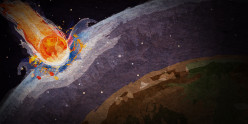LIfe originated from outer space?

I was reading an article about an Astrobiologist from Cardiff University a Professor Chandra Wickramasinghe claiming that microbes from outer space arrived to Earth with the aid of comets and these may very well potentially be the seeds that instigated life.It's an interesting thought. I did read somewhere once that Protein is not natural to earth (and it's the core of most of life on our planet), and a possible explanation as to how it arrived here was via comets, asteroids etc.
Still, it begs the question as to how these origins of life first came into being.He claims that? Did he say where the microbes came from in the first place?
No way? You just heard of this? The first time I heard it, I dropped my brand new "Sgt. Peppers" album.
Not quite, just read an article on the train today, came home and in full blown prometheus mode thought i'd pick the worlds brain and see if any one has any further angles or contributions to add to the discussion. The indian Sanskrit epics speak of it beings from the sky.. Muslims speak of beings called Jinns.. kind of fascinating,..though I have deviated from origins of life to plain extra-terrestial
Thanks for clarifying, Uncle Martin.
http://youtu.be/gdkZSXQ3aZg
- scottcgruberposted 13 years ago
0
There are two different hypotheses here.
One is Panspermia - the idea that Earth was "seeded" with microbes billions of years ago - intentionally or unintentionally - and these alien microbes were the common ancestor of all living things. It's an interesting idea, and somewhat plausible - some bacteria and even small multicellular organisms are able to survive the harsh conditions of interplanetary space. As an abiogenesis concept, however, it's a disappointing punt that shifts the question of how life began to another time and place.
The other hypothesis here is that the early bombardment of comets and asteroids during Earth's formation brought us the amino acids and nucleotides that would eventually become the first forms of life. I find this much more realistic than panspermia.This is a very good answer but to be honest I'm a little confused by it. If panspermia is the idea that Earth was "seeded" with life, whether intentionally or not, then what is the difference between this and the second hypothesis which suggests that the amino acids, etc that make up the building blocks of life/protein were brought to Earth via asteroids and comets? It has been announced that the building blocks of protein that contribute towards life on Earth have indeed been found on asteroids and meteors in outer space... both explanations, to me, seem to be saying the same thing.
They are similar, but have very different implications. In panspermia, life originated elsewhere, then living cells - with DNA, ribosomes, cell membranes, etc- came to Earth and evolved into all current life forms.
The other idea is that basic organic compounds formed in space and came to Earth via comets and asteroids, then formed into more complex polymer chains and eventually living cells here on Earth.
We have evidence for the latter hypothesis now, with findings of amino acids and other organic compounds in comet dust and meteorites. If we find life elsewhere in the solar system that shares cell structures and DNA/RNA sequences with Earth life, it would be strong evidence for panspermia.Okay, so if I understand correctly in panspermia life had already evolved to some extent before it reached Earth but in the second theory life didn't necessarily begin to 'evolve' as such until it had already reached Earth (and therefore the conditions to evolve). But if life is found elsewhere in the universe why is the origin of life more likely to be a case of panspermia when it's possible that the life in question may have gone through the same process of not evolving until it reached it's destination? (assuming that the life is found in environmental conditions where life can survive).
Close. In the first hypothesis (panspermia) living cells fell to Earth and evolved from there. In the second (more likely) hypothesis non-living matter fell to Earth and then formed the building blocks of cells through abiogenesis.
If life is found in the frigid lakes of Titan and it is very similar to Earth life - using the same proteins and cell components and gene sequences as life on Earth - it is a strong argument that life either began in one place and seeded the other, or began somewhere else entirely and seeded both worlds.
If, on the other hand, we find life on Titan that is radically different from Earth life - uses chirally-different amino acids, or uses glycol nucleic acid (GNA) instead of DNA, or is some other form of biochemistry we can't even imagine - it is evidence against panspermia.
No matter what, all matter is made up from stars, well, compressing and then exploding. So whether life came from here or another planet, it would change little as to the process by which life formed from lifeless matter.
Yes, but if the earth was "seeded" intentionally, it kind of makes the probability to get harvested a little higher.

This is true, our counterparts could come get us!! But...would they have evolved to look like us, or would they have evolved to fit their own environment? Or would their environment be the same, enabling them to evolve into us, or, or, or, so many questions!
I am leaning towards the "seeded intentionally" theory which includes some necessary bio ingredients from the stars. It seems more plausible from everything I have read.
I tend to agree with the amino acids theory, but there are a whole bunch of other fun ones out there, too.
The one that tends to get my imagination roaring is that the Earth is actually a zoo for planets throughout the universe. I can't remember where I'd read it, but basically, it states that each species was taken from another planet somewhere in the universe and put on Earth to continue living.
I'm not sure why the idea of UFOs being visitors to a planet-wide zoo cracks me up so much.
So, next time you hear something knocking and you can't figure out what it is, maybe it's some snot-nosed alien kid trying to get you to do something interesting.
Related Discussions
- 9
Life Found in Space
by Sherlock221b 14 years ago
NASA have examined a meteorite, which was created by a recent asteroid collision. It has been found to contain living DNA, thus proving that life does exist outside of our planet. This backs up the theory that life may have come to Earth with such a meteorite, and raises the possibility...
- 1
Life in outer space
by None 6 years ago
You wana go to Mars? Or travel through universe? Or wonder whats out there in the deep immense universe?
- 52
Possible Evidence of Life on Titan!
by kerryg 15 years ago
I'm amazed this isn't bigger news.Scientists are reporting possible evidence of primitive life on Titan! Titan has been suspected for along time of being capable of supporting some form of life, but this is the first evidence that there might actually BE life. At this point, the discovery is still...
- 102
Origin of Species without Origin of Life?
by TruthDebater 15 years ago
Is it possible to know the origin of species without knowing the origin of life? Is to know how life evolves or changes into new species knowing the origin of species? I do not see how understanding the changing of life is understanding the origin of life. Is the origin of species misleading for...
- 14
Do you think there are life forms like us in the vast outer space?
by Justin Choo 15 years ago
Do you think there are life forms like us in the vast outer space?
- 6
What is Panspermia?
by andrew savage 13 years ago
What is Panspermia?

















